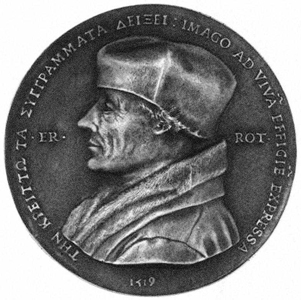Academia Europaea
The Academy of Europe#
The Erasmus Medal#
The Erasmus Medal (and the accompanying Lecture) is a ‘highlight’ of the year for the Academia Europaea. The Medal is awarded to honour the very best in European scholarship and personal academic achievements over a sustained period. The award is made to an individual scholar.
General criteria for the award#
The Erasmus Medal of the Academia Europaea, is awarded by the Board of Trustees and is based on the recommendation of the medal Committee following an in depth peer review. The award can be made to members of the Academia Europaea, or in exceptional circumstances to a non-member. The medallist is also invited to give the annual Erasmus Lecture and, if appropriate, may be inducted into membership as a part of the award.
The award is made to a scholar drawn in turn, from the broad disciplinary scope of each of the four Classes of the Academia Europaea. Each class is the focus of the medal cycle once in a four-yearly cycle.
The medal Committee is appointed by the Board at the start of each cycle.
The Committee is chaired by the appropriate Class Chair of each cycle.
The Committee members are the Section chairs of the Class that is the focus of that annual cycle.
The Committee shall take into account the following:
- All purely academic nominations must be supported by detailed evidence of the suitability of any candidate. This includes; their international standing, their achievements/impacts in their respective field(s) and the impact on European scholarship and the community of scholars.
- Candidature is not restricted to members of the Academia Europaea, and in case of a non-member judged suitable to receive the award: the award automatically comes with an invitation to membership. Therefore, nominations for candidates who might not meet the ‘normal’ Academic/scholarship criteria for membership of the Academia Europaea, may be considered only where there is substantive evidence of a significant and long term impact on scholarship and learning through their own personal actions and/or, where their involvement in ‘the European learning sector’ and environments has contributed in a substantial way to the promotion of, and support for research and learning.
- The Board of Trustees have indicated a preference for the award to be given to Europe based scholars (of any nationality).
- The award is in two parts - the medal and the public lecture. The lecture will be published.
- Due to the nature of the award and the lecture, posthumous nominations are not eligible.
- The award is an integral part of the annual conference of the Academia Europaea. As such, the award cannot be made in absentia [except in extreme circumstances].
- Officers or Trustees of the AE can only be nominated for the Erasmus Medal after their terms of office/Board membership have expired.
- Where possible, the medallist should be selected one year before the award is actually given.
- Being a recipient of other awards is no barrier to receiving the Erasmus Medal.
The procedure for identifying candidates to receive the award: #
1. The chair of the medal Committee will initiate the open call and members of the Committee will send the call to the members of their respective sections. The call will be published on the AE website and in regular member newsletters.
All members of Academia Europaea are most welcome to submit a nomination. Members of Class B (Exact Sciences) are particularly invited to nominate.
All nominations will be made on a nomination form and in addition, will contain a citation (as the basis for the ‘case for the award’), and be signed with one (or more) nominator(s). Self-nominations are not accepted. The nomination should consist of the citation, the argument for granting the award, a concise summary of the achievements and impacts (both in terms of the fields and disciplines and more widely) by the candidate over a sustained period, and it should include the candidate’s CV and selected publication list. The chair of the medal Committee will collect the nominations.
2. The nominations will be assessed and ranked by the individual members of the medal Committee. The whole Committee will make a single final and ranked list of candidates. The Chair of the Committee will present the list, with the Committee recommendation to the Board of Trustees.
3. The Board of Trustees will decide on the awardee. The Board may ask for a delay to seek additional information, or clarification, or to seek additional expert advice. The Board may in specific circumstances, decide not to make an award in any one year. In this case, the Committee will be made aware of the reasons for such a decision.
4. The invitation to the medallist will come from the Chair of the Medal Committee, on behalf of the Board of Trustees.
Additional criteria for the award of the Erasmus Medal.#
1. The medal is awarded as recognition of the importance of an individual’s sustained contribution to a discipline or field of scholarship over a sustained period. It is not intended as a prize to recognise a singular achievement, invention, discovery or single work of scholarship.
2. The assessment is based upon the evidence provided and the spectrum of published works by the candidate as listed in the nomination.
3. The citation made by the nominators is an important piece of the evidence that the Committee will review.
4. The Committee will base their assessment on the evidence provided and may if appropriate seek additional expert views and comment from outside of the Committee.
5. The Committee will take into account the quality of the candidate as a potential speaker for a mixed, well educated, but non-specialist audience.
The Erasmus Medal and lecture are currently sponsored by The Heinz-Nixdorf Foundation .
.
Document
- Erasmus Medal policy
 (adopted by the Board on 15th July 2014, amended January 2025)
(adopted by the Board on 15th July 2014, amended January 2025)



